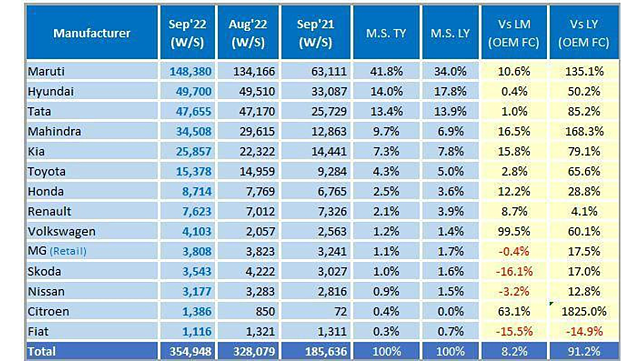
Passenger vehicle sales in September were as buoyant as expected with a net tally of nearly 3.6 lakh units, nearly twice as much as September 2021 and 10% over the preceding month (August 2022 which was around 3.3 lakh units).
As automakers are gradually getting out of the grasp of the chip crisis, they will have reasons to be pleased with the September turnaround. After all, the industry has gone through tremendous turmoil in the last couple of years right from the huge transition from Bharat Stage 4 to BS 6 to coping with the shock of the pandemic in early 2020.
The lockdowns that followed not only affected the economy and perhaps the only consolation was that India was not alone since the whole world had been affected. Supply chain challenges followed, people lost their jobs and buying cars was the last thing on anyone’s minds.
However, things are now back on track except that the semiconductor shortage turned out to be a dampener. Although there was demand for cars and SUVs, manufacturers could not keep up with orders as production was hampered due to the chip shortfall.
It now looks as if the worst is over if September sales are any indication. In an earlier interaction with Mobility Outlook, Manish Raj Singhania, President, FADA (Federation of Automobile Dealers Associations) said passenger vehicle sales would touch a new peak this fiscal.
September saw total numbers touch 355,946 units which were 91% more than what was recorded in the same month last year and the highest the industry has ever achieved.
Market leader, Maruti Suzuki India’s domestic sales were 148,380 units, more than twice what was recorded in the same month last year (63,111) and 10% more than the preceding month (August) of 134,166 units.
The Korean duo of Hyundai Motor India and Kia India have reported to grow by 50.2% and 79% respectively. HMIL clocked sales of 49,700 units in the month as compared to 33,087 units in the same time last year. Kia India managed to close September 2022 with sales of 25,857 units (14,441 last year). Even while both brands remain competitors, they are part of the Hyundai group and clearly the biggest challenger to Maruti Suzuki.
Tata Motors was a very close third to Hyundai with September sales at 47,864 units as compared to 25,898 units retailed in the same month last year. The company has already set itself a target of 500,000 units this fiscal and may well surpass this if the tailwinds in the market continue along with growing demand for the Punch.
Mahindra & Mahindra reported sales of 34,508 units which was a near three-fold jump from 12,863 units in September 2021. The company has had a very positive response to its latest offerings including the XUV 700, Thar and the new Scorpio. M&M is now back to focusing on its core business of SUVs which reflect its DNA of being a robust manufacturer in this space.
Toyota, which is now a global ally of Suzuki and working a lot more closely with Maruti, posted sales of 15,378 (9,284 last year) in September and continues to see brisk demand for its Innova Crysta. Market experts reckon that the growing collaboration with Maruti will now see Toyota gain more traction in the market.
Skoda Auto India, meanwhile, has reported domestic sales of 3,543 units in September, a growth of 17% over last year’s tally of 3,027 units. its India ally, Volkswagen, grew by 60% and reported sales of 4,103 units in September. The two companies will have reasons to be pleased with the way the India 2.0 initiative is panning out with products like the Kushaq and Slavia (from Skoda) getting the right customer vibes as also the VW Taigun and Virtus.
Renault reported sales of 7,623 units while its ally, Nissan, posted a tally of 3,177 units. MG Motor India clocked 3,808 units while Honda Cars posted a near 30 % growth with 8,714 units in September.

Commercial Vehicles
As for the commercial vehicle segment Tata Motors registered year-on-year growth of 9% with September totalling 32,979 units. Ashok Leyland’s tally was 16499 units, compared to 8,787 units in the same month last year. The other players in the truck and bus space include VE Commercial Vehicles and Daimler India Commercial Vehicles.
Manufacturers are looking at brisk growth in the medium and heavy duty space thanks to investments in infrastructure and buoyant growth in construction and housing. Intracity pickups are also doing well thanks to the booming e-commerce business which in turn is also fuelling electrification.